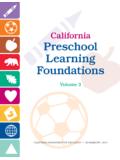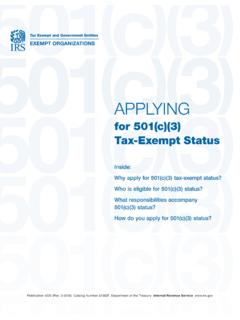Transcription of IRC 501(c)(4) Organizations - irs.gov
1 Exempt Organizations -Technical Instruction Program for FY 2003 IRC 501(c)(4) Organizations By John Francis Reilly, Carter C. Hull, and Barbara A. Braig Allen Exempt Organizations -Technical Instruction Program for FY 2003 IRC 501(c)(4) Organizations By John Francis Reilly, Carter C. Hull, and Barbara A. Braig Allen Overview Purpose This article discusses issues relating to the tax-exempt status under IRC 501(c)(4) of civic leagues, social welfare Organizations , and local associations of employees. As of March 31, 2002, there were 121,170 Organizations recognized as tax-exempt under IRC 501(c)(4). Rules relating to the political campaign and lobbying activities of IRC 501(c)(4) Organizations are the subject of a separate article. In This Article This article contains the following topics. Topic See Page Overview 1 Statutory Provisions 2 Social Welfare Organizations 3 Homeowners' and Tenants' Associations 12 Veterans' Organizations 22 Organizations Supported by Government 23 "Social Welfare" and "Charity" 25 Social and Recreational Activities 27 Business Activities 28 Police and Firefighters' Relief Organizations 32 Health Care Organizations 33 Local Associations of Employees 34 IRC 4958 and Inurement 36 Detailed Subject Directory 37 IRC 501(c)(4)
2 Organizations page I-1 Exempt Organizations -Technical Instruction Program for FY 2003 Statutory Provisions The Statute IRC 501(c)(4) provides for exemption of: Civic leagues or Organizations not organized for profit but operated exclusively for the promotion of social welfare. Local associations of employees, the membership of which is limited to the employees of a designated person or persons in a particular municipality and the net earnings of which are devoted exclusively to charitable, educational, or recreational purposes. The statutory terms disclose that IRC 501(c)(4) embraces two general classifications: a. Social welfare Organizations , and b. Local associations of employees. Statutory History The predecessor of IRC 501(c)(4) was enacted as part of the Tariff Act of 1913. Tariff Act of 1913, ch. 16, II (G)(a), 38 Stat.
3 172. We have no legislative comment on the statute. It is generally assumed, however, that its enactment was the result of a Chamber of Commerce request for an exemption for "civic and commercial" Organizations . See Hearings on Tariff Schedules of the Revenue Act of 1913 Before the Subcomm. of the Comm. on Finance, 63d Cong., 1st Sess. at 2001. (1913). In 1924, the statute was amended to include local associations of employees because these Organizations had been denied exempt status on the basis that they provided services to a limited group of beneficiaries. Revenue Act of 1924, ch. 234, 231(8), 43 Stat. 282; Staff of the Senate Comm. on Finance, Statement of the Changes Made in the Revenue Act of 1921 by 6715 and the Reasons Therefore, Gregg Statement, Comm. Print. 68th Cong. 1st Sess. at 23 (1924). Effective September 14, 1995, Organizations exempt under IRC 501(c)(4) may not allow any part of their net earnings to inure to the benefit of any private shareholder or individual.
4 Further, insiders and organization managers may be subject to the excise tax imposed by IRC 4958 if assets or services are provided to insiders for less than fair market value. Taxpayer Bill of Rights 2, Pub. L. No. 168, 1311(a), 104th Cong. 2d Sess (1996), 110 Stat. 1452. IRC 501(c)(4) Organizations page I-2 Exempt Organizations -Technical Instruction Program for FY 2003 Social Welfare Organizations Introduction Reg. 1. 501(c)(4)-1(a)(2)(i) provides that: [A]n organization is operated exclusively for the promotion of social welfare if it is primarily engaged in promoting in some way the common good and general welfare of the community. Obviously the language of both the statute and the regulations comprehends a very broad category of Organizations . As stated in the 1981 CPE text, Chapter G, "Social Welfare: What Does It Mean?
5 How Much Private Benefit Is Permissible?" Although the Service has been making an effort to refine and clarify this area, IRC 501(c)(4) remains in some degree a catch-all for presumptively beneficial non-profit Organizations that resist classification under the other exempting provisions of the Code. Unfortunately, this condition exists because "social welfare" is inherently an abstruse concept that continues to defy precise definition. The general concept, however, can be expressed as follows: Organizations that promote social welfare should primarily promote the common good and general welfare of the people of the community as a whole. An organization that primarily benefits a private group of citizens cannot qualify for IRC 501(c)(4) exempt status. In Erie Endowment v. United States, 316 151, 156 (2d Cir.)
6 1963), the court, in defining a civic organization, summed up the matter by stating that "the organization must be a community movement designed to accomplish community ends." Continued on next page IRC 501(c)(4) Organizations page I-3 Exempt Organizations -Technical Instruction Program for FY 2003 Social Welfare Organizations , Continued A Note on Services to Members While some activities promote social welfare only if the community as a whole is the recipient of services, a membership organization is not automatically precluded from exempt status under IRC 501(c)(4). In the exceptional case, an organization whose services are made available solely to its members may qualify. In such cases, it must be clearly established that making the service available to the membership benefits the community as a whole. Precedents Illustrating Community Benefit Precedents: An organization that purchases acreage in a stated locality, makes arrangements for water and sewage facilities and enters into arrangements for the erection and sale of dwellings to low and moderate income individuals qualifies as a social welfare organization.
7 Rev. Rul. 55-439, 1955-2 257. A corporation organized for the purpose of rehabilitating and placing unemployed persons over a stated age may be exempt as an organization operated exclusively for the promotion of social welfare. Although substantial private benefit to the unemployed individuals exists, the community benefit found in employing those individuals is dominant. Rev. Rul. 57-297, 1957-2 307. A corporation formed to provide a school district with a stadium is exempt as an organization operated for the promotion of social welfare. Title to the stadium is to be transferred to the school district after all indebtedness has been liquidated and its capital stock retired, with no profit to the stockholders. Rev. Rul. 57-493, 1957-2 314. A corporation was formed to cooperate with the parent-teacher association of a local school district.
8 Its activity consists of reviewing the proposals of and designating the insurance company allowed to solicit accident insurance from the students, teachers, and other employees of the school district. It qualifies for tax-exempt status under IRC 501(c)(4). Rev. Rul. 61-153, 1961-2 114. Continued on next page IRC 501(c)(4) Organizations page I-4 Exempt Organizations -Technical Instruction Program for FY 2003 Social Welfare Organizations , Continued Precedents Illustrating Community Benefit, continued A corporation organized to aid and promote the purposes of the Area Redevelopment Act by providing loans to purchase or develop lands and facilities to alleviate unemployment in areas classified as "redevelopment areas" is entitled to exempt status as an organization described in IRC 501(c)(4). Rev. Rul. 64-187, 1964-1 (Part 1) 187.
9 A memorial association organized to study and develop methods of achieving simplicity and dignity in funeral and memorial services, educate and inform its members as well as the public as to the results of such study, and maintain a registry for the wishes of its members in regard to arrangements following death is entitled to exemption as a social welfare organization described in IRC 501(c)(4). The organization serves a social welfare purpose through education of the public and providing a useful service to the community (membership is available to everyone) on a noncommercial basis. Rev. Rul. 64-313, 1964-2 146. A junior chamber of commerce operated exclusively for the purpose of rendering civic services for the promotion of the welfare of the community and its citizens is exempt from federal income tax as an organization described in IRC 501(c)(4).
10 Its various programs, such as activities on behalf of youth, community benefit projects, and community leadership training, promote the common good and general welfare of the people of the community. However, ordinary chambers of commerce, which are organized to promote the business interests of a community, instead generally qualify for exemption under IRC 501(c)(6). Rev. Rul. 65-195, 1965-2 164. An organization formed to advise, counsel, and assist individuals in solving their financial difficulties by budgeting their income and expenses and effecting an orderly program for the payment of their obligations is entitled to exemption from federal income tax as a social welfare organization described in IRC 501(c)(4). The objective and activities of the organization contribute to the betterment of the community as a whole and are therefore regarded as promoting social welfare.
















